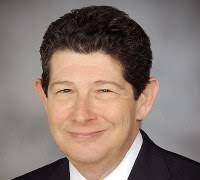By Lee Chottiner
Community Editor
As the world watched Tuesday while the United Kingdom became the first western nation to administer a clinically approved vaccine to its people, one man in Jewish Louisville was intimately familiar with the experience.
Dr. Jon Klein, professor of medicine at the University of Louisville and vice dean for research, recently took part in a clinical trial for the BioNTech-Pfizer vaccine – the same one being administered in the U.K. His wife, Laura, also participated in the trial as have other Jews in the community.
Klein, who spoke Sunday at a program sponsored by Adath Jeshurun, largely touted the experience, saying the side effects – for those in the group who had them – amounted to sore arms, fatigue, headaches and muscle aches.
“For me personally, I thought the side effects of getting the vaccine were really very tolerable,” Klein said, “and I think most people in our group were very, very happy to trade those side effects for having received the vaccine.”
Klein and his wife were inoculated mid-August at a pediatrics practice in Bardstown. They were among a group of 12 taking part in the trials. Half the group got the vaccine; the other half, a saltwater placebo. (Klein knows he received the actual vaccine because of his sore arm, which he described as a “dead giveaway.”)
All the participants were taking part in a medically groundbreaking procedure.
“We knew it was the Pfizer trial,” Klein said. “Therefore, we knew it was an RNA vaccine, so a vaccine that’s never really been given to humans before.”
RNA vaccines, unlike a normal vaccine, work by introducing an mRNA sequence (the molecule that tells cells what to build), which is coded for a disease-specific antigen, according to material provided by the University of Cambridge, England. Once produced within the body, the antigen is recognized by the immune system, preparing it to fight the disease.
RNA vaccines are faster and cheaper to produce than traditional vaccines. Because they are not produced using infectious elements, they are generally considered safer for the patient.
Klein, who received the two doses of the vaccine three weeks apart, experienced only minimal side effects: a sore arm and some muscle and joint aches.
The aches occurred 24 hours after the second injection, close to bedtime. But he took pain relievers, slept, and they were gone when he woke up.
“The sore arm lasted maybe two days,” he said, “but it didn’t keep me from jumping on my bicycle and going out for a nice long ride.”
He cautioned against presuming that people will have protection built up after the first dose alone.
“I would not assume ever that I had protection after just one injection. You really have to get that booster shot three weeks afterwards.”
Klein has been a familiar face in Louisville since the onset of the coronavirus pandemic. Since March, he has appeared weekly with Mayor Greg Fischer on his Facebook and live video broadcasts. He also appears regularly on WLCL-FM and WBCE-AM, updating listeners on the virus and COVID-19, the disease caused by it.
In addition to his virtual AJ appearance, he will be speaking next week at an online program for Temple Shalom. He said he tries to accept speaking invitations whenever he can.
The Pfizer vaccine, which was developed in Germany and the United States, is the one of three vaccines poised for widespread clinical approval and distribution next year. The other two are Moderna (United States) and AstraZeneca (United Kingdom).
Given his position as a physician and scientist, Klein said he considered it an obligation to take part in the trial.
“It’s important for physicians and scientists and also politicians to roll up their sleeves and set the example, to try and persuade people that this is something they really need to do.”
Though he and his wife have taken both doses, they are hardly done with the trial. They have been committed to be tested every six months for a two-year for after-effects, having their blood drawn and their antibodies monitored.
Not a problem, Klein said. “It’s a beautiful ride down to Bardstown.”



